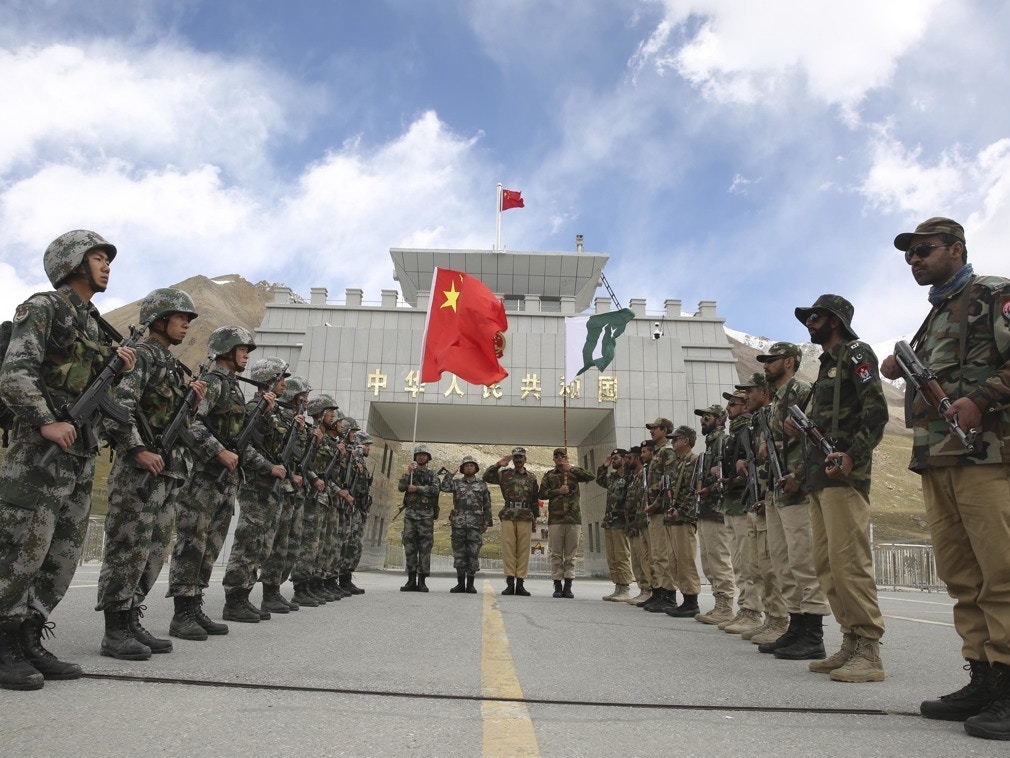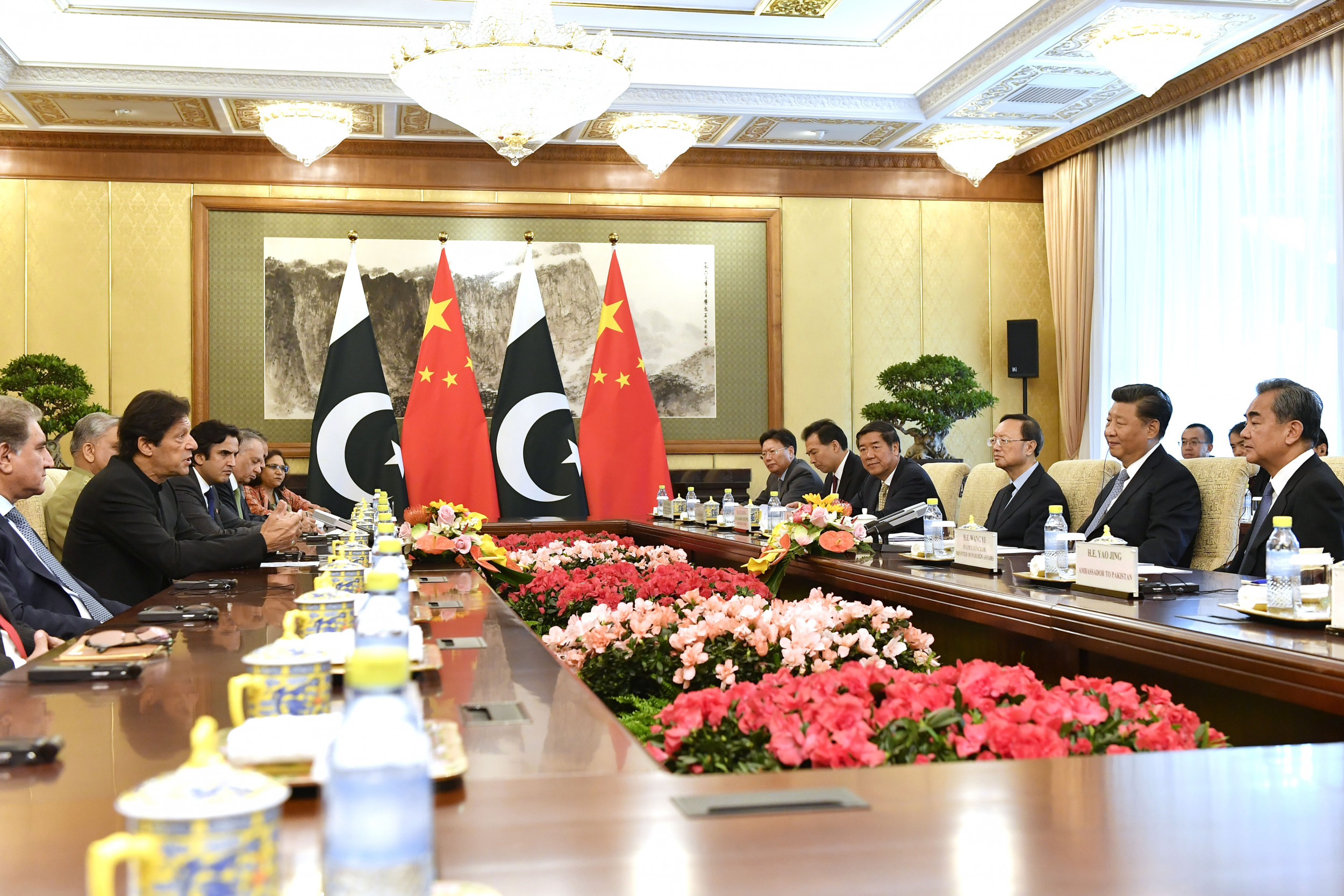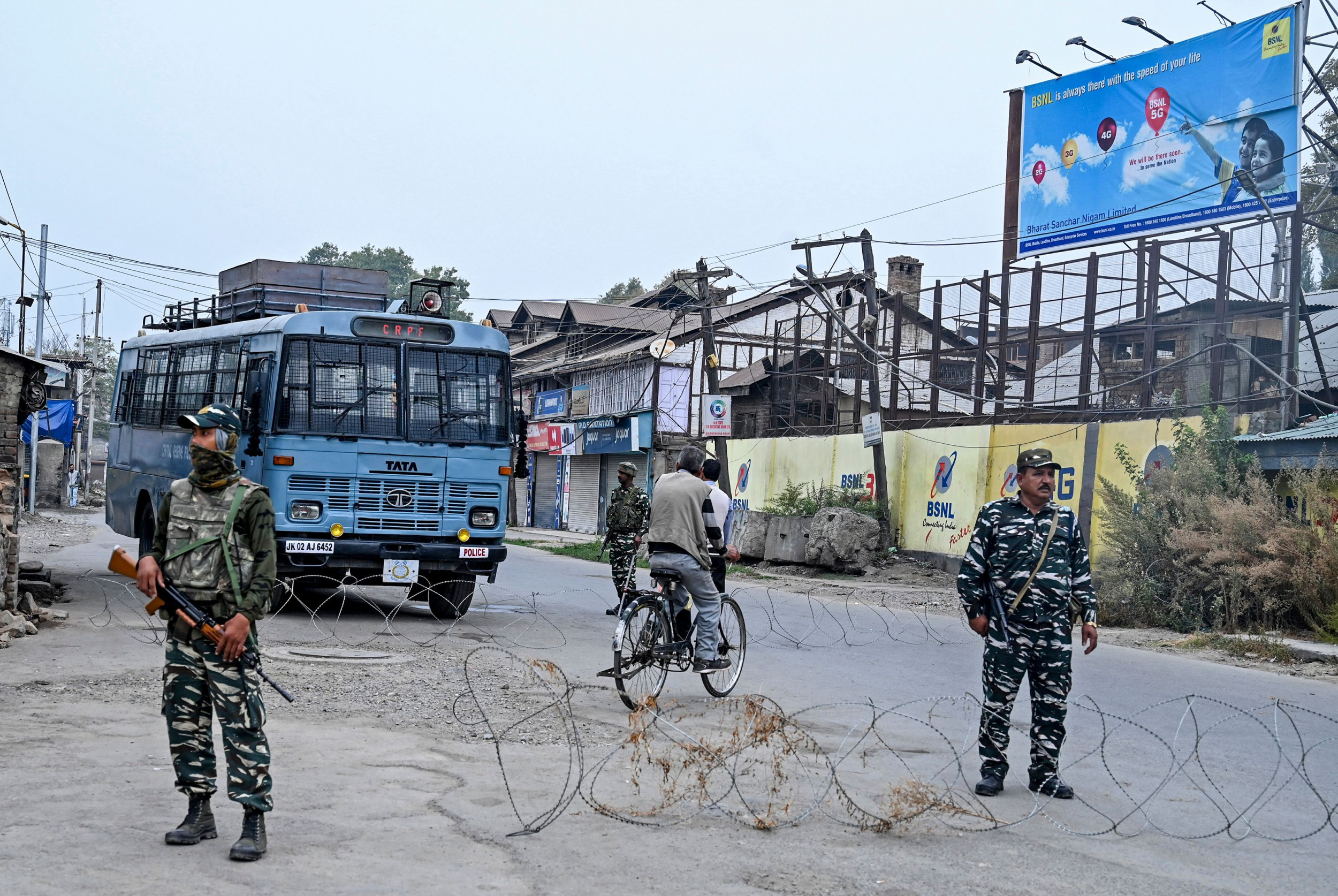中国习近平主席在克什米尔问题上向巴基斯坦总理伊姆兰·汗表示支持,并在与印度总理纳伦德拉·莫迪会晤前几天加强了两国的军事联系。
汗的办公室称,他在不到一年的时间里第三次访问北京,在周三与Xi的会晤中,他“强调了中国是巴基斯坦坚定的盟友、坚定的伙伴和铁哥们”。汗“坚持认为,中国坚定支持巴基斯坦的核心国家利益,并在推进巴基斯坦的经济和国家发展目标方面发挥了重要作用。”
中国外交部形容两国的友谊“牢不可破,坚如磐石”,合作“不断扩大和深化”这两个办事处都指出,汗向Xi表达了他对印控克什米尔紧张边界的人道主义局势的关切。自新德里取消有争议领土的特殊地位以来的两个月里,克什米尔一直处于封锁状态,这激怒了伊斯兰堡和北京。
中国外交部表示:“习近平表示,中国关注克什米尔局势,是非分明。”。“中国支持巴基斯坦方面维护自己的合法权益,希望双方通过和平对话解决争端。”

2018年6月26日,中国人民解放军新疆军区和巴基斯坦武装部队昆杰拉布安全部队边防部队在中国西北新疆维吾尔自治区联合巡逻前敬礼。
最近几周,新闻周刊采访过一些巴基斯坦高级官员试图提高人们对他们所警告的问题的认识,不仅是印度管理的克什米尔地区的人道主义灾难,也是这两个长期对手之间又一场全面冲突的潜在催化剂,这场冲突可能导致核战争。汗在2007年也表达了类似的关切热情洋溢的讲话上月底提交给联合国大会。
莫迪在他自己的联合国演讲中没有提到克什米尔,但称之为“世界团结起来反对恐怖主义绝对必要”,他的政府经常指责伊斯兰堡支持这一点。印度联合国代表团援引其“答辩权”,谴责汗讨论“边缘政策而非政治家风度”,重复了这些指控
自从1947年前英国统治的克什米尔被分割,导致数十万人死亡以来,这两个国家就克什米尔问题打了三场战争。今年2月,一个巴基斯坦军事组织在印度控制的克什米尔发动致命爆炸,导致印度失去一架战斗机的跨境交战,导致局势再次急剧升级。伊斯兰堡归还了被俘飞行员,但新德里拒绝将此举视为和平姿态。
自从印度废除保证克什米尔半自治地位的第370条和第35条a款后,汗停止了谈话。然而,北京方面也谴责了这一举动,因为它在技术上适用于中国统治下的阿克塞钦边境地区,但新德里方面声称拥有主权。
在1962年与印度的一场战争中,中国与邻国发生了领土争端,确保了对阿克塞钦的主权。2017年夏天,在印度军队与中国人员在两国和不丹的另一个争议点附近的另一个边境修建公路发生冲突后,双方几乎再次开战。

10月9日,巴基斯坦总理伊姆兰·汗(左二)在钓鱼台国宾馆会见中国习近平主席(右二)。几天后,在南亚两个敌对邻国因克什米尔争端关系紧张之际,Xi将在尼泊尔会见汗的印度对手纳伦德拉·莫迪。帕克·宋-普尔/盖蒂图像公司
除了这些争议,中国还作为战略伙伴对巴基斯坦进行了大量投资,Xi将这个南亚国家视为其一系列洲际基础设施项目“一带一路倡议”的重要走廊。两国的伙伴关系在国防领域也有所体现,有各种联合演习和军事技术协议。
在汗和Xi会晤的前一天,巴基斯坦陆军总参谋长贾韦德·巴杰瓦会见了中国中央军委副主席许启亮。官方新华社报道称,双方同意推进军事关系,巴基斯坦武装部队官方网站中国军方“支持巴基斯坦在克什米尔问题上的原则立场”,并赞赏“巴基斯坦为和平利益采取的明智做法”
“他们一致认为,巴基斯坦和印度之间悬而未决的紧张局势将对该地区的和平与稳定产生严重影响,”一份官方新闻稿称,并补充说巴杰瓦通知徐,“巴基斯坦期待和平,但这不应以牺牲国家的原则、荣誉和尊严为代价。”
随着Xi在汗的领导下继续加强与巴基斯坦的接触,唐纳德·特朗普总统的政府采取了一种更冷静的方式,回应莫迪对恐怖主义的一些担忧,同时也寻求遏制中国日益增长的全球影响力。在最近的一次采访中巴基斯坦外交部长沙阿·马哈茂德·库雷希告诉记者新闻周刊他注意到华盛顿拥抱新德里的“明显转变”。
“这种转变发生在8月5日之前,”库雷希告诉记者新闻周刊注意到印度在它控制的克什米尔地区的权力发挥的日期。“你可以看到,今天的美国正把印度视为他们在该地区的战略伙伴,这也与中国的遏制政策有关。”

9月28日,在印度管理的克什米尔斯利那加的严格封锁期间,印度安全人员站岗封锁道路。印度取消了克什米尔在其控制下的特殊半自治地位,引发了社会动荡和巴基斯坦的愤怒。
汗在他的联合国演讲前夕还称赞了中国,他在纽约的一次亚洲协会活动中说,“当我们跌到谷底时,中国来支持我们,他们在各方面确实帮助了我们,不仅为我们提供了外汇储备方面的帮助,而且“一带一路倡议”也在某种程度上发展了他们帮助我们发展农业和提高生产力的方式。”
他否认这导致了中国对巴基斯坦的不当影响,正如美国经常声称的那样,他说,“在你必须这样做的条件下,我们没有得到任何帮助。”
北京和伊斯兰堡的拥抱,冷战时期的动态过去也包括华盛顿在内,这为Xi在南亚提供了新的机会,也使其与新德里有了一定的距离。传统上,印度一直是俄罗斯更紧密的伙伴,俄罗斯向这个崛起的经济超级大国出售其最先进的S-400地对空导弹系统,无视美国的制裁威胁。
然而,就在他会见汗几天后,Xi将在印度南部城市钦奈附近与莫迪举行他的第二次非正式峰会。这两个人分别掌管着世界第二大和第三大经济体,并试图扩大他们在亚洲的影响力。
这两个地区强国之间的拔河在尼泊尔经常很明显,共产党选举的胜利让政府更接近北京。在与莫迪会谈后,Xi准备对这个夹在中印之间的喜马拉雅小国进行20多年来的首次总统访问,寻求通过“一带一路倡议”项目加强经济联系。
CHINA'S XI SUPPORTS PAKISTAN ON KASHMIR, BOOSTS MILITARY TIES AHEAD OF MEETING WITH INDIA
Chinese President Xi Jinping has offered his support to Pakistani Prime Minister Imran Khan on the issue of Kashmir and boosted military ties between the two just days before a meeting with Indian Prime Minister Narendra Modi.
In his third trip to Beijing in less than a year, Khan's office said he "underscored that China was Pakistan's steadfast ally, staunch partner and iron brother" during Wednesday's meeting with Xi. Khan "maintained that China had firmly stood by Pakistan in supporting Pakistan's core national interests and played a major role in advancing Pakistan's economic as well as national development goals."
The Chinese Foreign Ministry described the friendship between the two countries as "unbreakable and rock-solid" with cooperation that "continued to expand and deepen." Both offices noted that Khan expressed to Xi his concerns about the humanitarian situation across their tense borders in India-administered Kashmir, where a lockdown has persisted in the two months since New Delhi revoked the special status of the disputed territory, angering both Islamabad and Beijing.
"Xi Jinping said that China is concerned about the situation in Kashmir, the rights and wrongs are clear," according to the Chinese Foreign Ministry. "China supports the Pakistani side in safeguarding its legitimate rights and interests and hopes that the parties will resolve the dispute through peaceful dialogue."

Border defense units of the Chinese People's Liberation Army Xinjiang Military Command and Pakistan Armed Forces Khunjerab Security Force salute before a joint patrol in northwest China's Xinjiang Uighur Autonomous Region on June 26, 2018.
In recent weeks, Newsweek has interviewed a number of top Pakistani officials trying to raise awareness of what they warned a was not only a humanitarian disaster across in India-administered Kashmir, but a potential catalyst for another all-out conflict between the longtime rivals that could lead to nuclear war. Khan voiced similar concerns during an impassioned addressto the United Nations General Assembly late last month.
Modi made no mention of Kashmir in his own U.N. speech, but called it "absolutely essential for the world to unite against terrorism," something his administration has often accused Islamabad of supporting. Such charges were repeated by India's U.N. delegation as it invoked its "right of reply," denouncing Khan for discussing "brinksmanship not statesmanship."
The two countries, who have fought three wars over Kashmir since the 1947 partition of the former U.K.-ruled colony that left hundreds of thousands dead, saw another dramatic escalation in February after a deadly bombing in India-administered Kashmir by a Pakistan-based militant group led to cross-border engagements that saw India lose a fighter jet. Islamabad returned the captured pilot but New Delhi declined to view the move as a peace overture.
Khan has ceased attempts to talk since India's repealed Articles 370 and 35a guaranteeing its share of Kashmir's semi-autonomous status. Beijing, however, also condemned the move as it technically applied to the bordering Aksai Chin area under Chinese rule, but claimed by New Delhi.
China has its own bitter history of territorial disputes with its neighbor having ensured its dominion over Aksai Chin in a 1962 war with India. In summer 2017, the two sides nearly fought again after Indian troops confronted Chinese personnel constructing a highway at another border near another disputed point between the two countries and Bhutan.

Pakistani Prime Minister Imran Khan (2nd L) meets with Chinese President Xi Jinping (2nd R) at the Diaoyutai State Guesthouse on October 9 in Beijing, China. Xi was set to meet Khan's Indian counterpart Narendra Modi in Nepal just days later amid tensions between the two rival South Asian neighbors over disputed Kashmir.
Beyond these disputes, China has also invested heavily in Pakistan as a strategic partner and Xi has envisioned the South Asian nation as a crucial corridor of his Belt and Road Initiative, a series of intercontinental infrastructure projects. The two countries' partnership has also manifested itself in the defense sphere, with various joint exercises and military-technical agreements.
A day before Khan and Xi's meeting, Pakistani Army Chief of Staff General Qamar Javed Bajwa met with Chinese Central Military Commission Vice Chairman Xu Qiliang. The official Xinhua News Agency reported that the two agreed to advance their military ties and the Pakistani armed forces' official website China's military was "supporting Pakistan's principled stance on Kashmir issue" and appreciated the "sane Pakistani approach in the interest of peace."
"They agreed that continued unresolved Pakistan-India tension will have serious implications for peace and stability in the region," an official release said, adding that Bajwa notified Xu "that Pakistan looks forward to peace but that shall not be at the cost of any compromise on principles or honour and dignity of the nation."
With Xi was continuing to intensify his engagement with Pakistan under Khan, President Donald Trump's administration has adopted a cooler approach, echoing some of Modi's concerns about terrorism while also seeking to roll back Beijing's growing global influence. In a recent interview, Pakistani Foreign Minister Shah Mehmood Qureshi told Newsweek that he noted an "obvious shift" in Washington's embrace toward New Delhi.
"That shift took place prior to the 5th of August," Qureshi told Newsweek, noting the date of India's power play in the share of Kashmir it controls. "You can see that America today is looking at India as their strategic partner in the region and its also linked to the China containment policy."

Indian security personnel stand guard to block a road while restrictions are imposed during a strict lockdown in Srinagar, India-administered Kashmir, September 28. India repealed the special semi-autonomous status of the share of Kashmir under its control, igniting social unrest and Pakistani anger.
Khan also praised China on the eve of his U.N. speech, telling an Asia Society event in New York that "China came to support us when we'd hit rock bottom, and they have really helped us in every way, not only provided us help with our foreign exchange reserves, but also the Belt and Road Initiative has sort of evolved way they have helped us with our agriculture, with our productivity."
He denied he that this had led to undue Chinese influence over Pakistan, as the U.S. has often claimed, saying "nowhere have we been helped on some condition that you have to do this."
While Beijing and Islamabad's embrace, a Cold War-era dynamic that used to include Washington as well, has offered Xi new inroads in South Asia, it has led to some distance from New Delhi. India, traditionally, has been a closer partner of Russia, which sold the rising economic superpower its state-of-the-art S-400 surface-to-air missile system, a defiance of U.S. sanctions threat.
Just days after his meeting with Khan, however, Xi was set to hold what would be his second informal summit with Modi near the southern Indian city of Chennai. The two men preside over the world's second and third-largest economies, respectively, and have sought to expand their influence across Asia.
The tug-of-war between the two regional powerhouses has often been apparent in Nepal, where a communist election victory has brought government closer to Beijing. Following his talks with Modi, Xi was set to make his country's first presidential trip to the tiny Himalayan nation sandwiched between China and India in more than two decades as he sought to shore up economic ties via Belt and Road Initiative projects.





